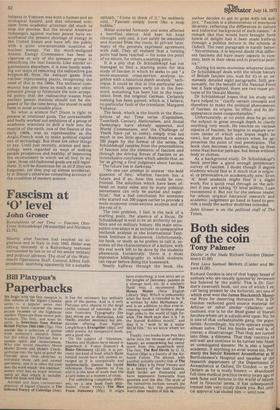Fascism at '0' level
John Groser
Revolutions of our Time — Fascism OttoErnst Schtiddekopf (Weidenfeld and Nicolson £2.75).
Shortly after fascism had reached its inglorious end in Italy in July 1943, Hitler was sitting morosely in a Rastenburg teahouse surrounded by ten or so of his senior military and political advisers. The chief of the Wehrmacht Operations Staff, General Alfred Jodi,' pondered, searching apparently for a suitable epitaph. "Come to think of it," he suddenly said, "Fascism simply burst like a soap bubble."
Hitler scowled furiously and some affected a horrified silence. Jodl kept his head (thought only just, it can safely be assumed) and hurried from the room. In private later, many of the generals expressed agreement with Jodi. They all realised that a turning point had been reached — for some the point of no return, for others a starting point.
It is a pity that Dr Schtiddekopf has not managed to find a starting point for this study of fascism in which he seeks to use "a socio-economic cross-section analysis together with a historical depth-analysis " technique. It could be that in this particular sentence, which appears early on in the foreword, something has been lost in the translation from the original German. Certainly nothing has been gained, which is, I believe, no particular fault of the translator, Margaret Valiance,
The book, which is the fourth in the Revolutions of our Time series (Capitalism, Twentieth Century Nationalism, and Social Democracy have already appeared, and World Communism, and the Challenge of Youth have yet to come), simply tries too much in too little space. Restricted to some 220 pages by the format of the series, Dr Schilddekopf rambles from the preconditions of fascism into the elements of fascism and through the driving forces of fascism to an inconclusive conclusion which admits that, so far as giving a final judgment about fascism, "The future lies in darkness."
"No one can attempt to answer 'the bold question of fate,' whether fascism has a future and if so, how this could be confronted. The solutions which have been offered on many sides and by many political movements can only be partial and superficial." Not a bad . conclusion for someone who started out 200 pages earlier to provide a socio-economic cross-section analysis and all the rest of it.
The real problem, I feel, is the lack of a starting point, the absence of a focus. Dr Schuddekopf is said to be an authority on politics and on military history. His main occupation nowadays is as lecturer in comparative textbook analysis at the International Textbook Institute in Brunswick. Unfortunately, his book, or study as he prefers to call it, assumes all the characteristics of a lecture, with the real work left to be done by the students afterwards. Incidentally, there is a most impressive bibliography to which students can repair before doing the homework.
Nearly halfway through the book, the author decides to get to grips with his subject. "Fascism is a phenomenon of enormous diversity, reflecting the differences in culture and historical background of each nation." A remark like that would have brought forth howls of delight had it been made halfway through a politics lecture in the schools at Oxford. The next paragraph is hardly better: "Nevertheless, it is beyond doubt that different fascisms did have many aspects in common. both in their ideas and in practical politics."
During his socio-economic whatever study, Dr SchOddekopf deals with the whole history of British fascism (no, wait for it) in an immensely detailed eight paragraphs. Still, presumably, for the benefit of the Natonal Front lest it feels slighted, there are two super pictures of Sir Oswald Mosley.
Dr SchUddekopf hopes that his study will have helped to "clarify certain concepts and therefore to make the political phenomenon of fascism, its origins, its effect and its disappearance more comprehensible."
Unfortunately, at no point does he go into the subject in great enough depth to clarify anything very much. He touches on various aspects of fascism, he begins to explore avenues (some of which one hopes might be new), but draws back always when he approaches the point of real penetration. The book then becomes a skeleton, dug up from some Nazi bunker perhaps, but bones without body or clothes.
As a background study, Dr Schilddekopf's book provides a good enough preliminary survey of fascism. I doubt though if degree students would find in it much that is original, or provocative,or academically new. Even 'A' level students might find it a slight work. For a quick read through on the subject if you are taking '0' level politics, I can recommend it. But not for the serious reader for whom original historical research and academic judgement go hand in hand to provide a study the author doubtless intended. John Groser is on the political staff of The Times,






























 Previous page
Previous page